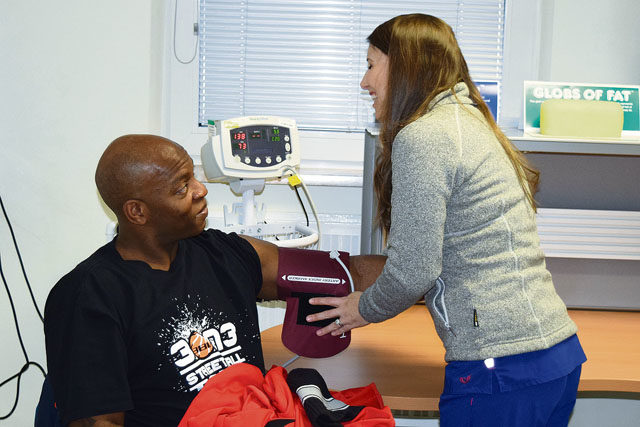
Natalee Fitzpatrick, a certified Health Educator at the Army Wellness Center Bavaria, conducts a patient health assessment with Staff Sgt. Michael Edwards, a Soldier assigned to the 7th Army Training Command, Feb. 2. Fitzpatrick took time to explain the health assessment procedures to Edwards, including the futuristic Bod Pod, a system that accurately measures body composition by determining body volume and body weight.
Many people resolve to start the New Year off on the right foot, get healthy, workout more and watch what they eat. These goals can often be hard to keep up with, but they don’t have to be with some help from an Army Wellness Center.
“Every day, well-intentioned people kick off ambitious journeys to get fit, lose weight, quit smoking, or manage stress,” said Rebecca Rhodes, Landstuhl Army Wellness Center Director. “And every day, just as many abandon their efforts for a variety of reasons — lack of time, lack of motivation, or the discouragement that comes from not seeing results quickly.”
She went on to say that doesn’t have to be the case.
“The Army Wellness Center staff wants to help individuals overcome the obstacles that stand between them and good health,” Rhodes said. “As fitness professionals and wellness coaches, we work diligently to help people establish (specific, measurable, attainable, realistic, and timely) goals early in their programs. Those who embrace the goal-setting process find it to be helpful, as they have defined exactly what they will work on. We empower our clients to set their own health goals and achieve them.”
Throughout the Regional Health Command Europe footprint, there are five AWCs. They are located in Landstuhl, Wiesbaden, Stuttgart and Vilseck, Germany; and Vicenza, Italy.
AWCs are designed to promote and sustain healthy lifestyles and improve the overall wellbeing of visitors.
According to the AWC headquarters, “AWCs offer a standard suite of six core programs that include health assessment review, physical fitness, health nutrition, stress management, general wellness education, and tobacco education.”
Rhodes elaborated saying, “AWCs help clients make healthy lifestyle decisions by providing access to state-of-the-art resources like fitness/metabolic/body fat testing, healthy nutrition and sleep advice, stress reduction using biofeedback, individualized fitness programs and health education.”
When someone first visits an AWC they will begin their journey with a Health Assessment Review, according to Rhodes.
“A HAR is a quick analysis of current health status, risk for disease and to determine if an increase in physical activity is safe. Based on the results of the HAR, clients are offered various AWC services to help meet their needs and future goals,” Rhodes said.
She went on to say, AWCs help clients make healthy lifestyle decisions and that follow-up visits to an AWC can help a person stay on track.
“It’s crucial for the client to continue to monitor their progression to stay on track,” Rhodes said. “The key to a client’s success is regular follow-ups with AWC staff for repeat measurements, goal reassessment and health coaching.”
Rhodes said she has received a lot of great feedback from AWC patrons. Feedback includes: great classes; helpful resources; informative; and excellent services.
One visitor, from the AWC in Bavaria, who has lost 20 pounds, said the best service they received from the AWC was the nutrition class.
“I learned that I had no idea how large my portions were, nor how many calories a day I was consuming,” the visitor said. “I took their advice and downloaded a calorie counting app. Since my life is pretty sedentary — long commute and a desk job — if I wanted to lose weight, I had to get my caloric intake under control.”
With the help of the app, this person started tracking everything they ate and realized they could eat the same things, but needed to do so in smaller portion sizes.
“I have lost 20 pounds in three months without any real increase in activity,” the individual said. “I simply try my best to not exceed the daily calorie goal established for me by the Wellness Center staff. In no way am I starving myself, nor have I ever felt really hungry since starting my weight loss journey.”
All services at AWCs are free for active duty service members, adult family members (18 years and older), retirees and Department of the Army civilians and Army Reserve and National Guard Soldiers. Primary Care Managers can submit referrals for patients to be seen at the AWC, but self-referrals are also accepted.
AWC services aren’t just for individuals. They also offer programs to help improve unit readiness and support physical fitness standards. This includes education to help avoid overtraining and related injuries.
All AWCs are led by a highly qualified and accredited staff of directors, health educators and health promotion technicians with various backgrounds in exercise science, exercise physiology and other allied health fields.
To learn more about the AWC or find the AWC closest to you, visit https://phc.amedd.army.mil.


